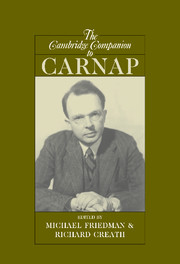Book contents
- Frontmatter
- Introduction: Carnap’s revolution in philosophy
- 1 Carnap’s intellectual development
- 2 Geometrical leitmotifs in Carnap’s early philosophy
- 3 Carnap and Frege
- 4 Carnap and Husserl
- 5 Carnap, Russell, and the external world
- 6 The Aufbau and the rejection of metaphysics
- 7 Carnap and the Vienna Circle: rational reconstructionism refined
- 8 Carnap and modern logic
- 9 Tolerance and logicism: logical syntax and the philosophy of mathematics
- 10 Carnap’s quest for analyticity: the Studies in Semantics
- 11 Carnap on the rational reconstruction of scientific theories
- 12 Carnap on probability and induction
- 13 Carnapian pragmatism
- 14 Quine’s challenge to Carnap
- Bibliography
- Index
13 - Carnapian pragmatism
Published online by Cambridge University Press: 28 April 2008
- Frontmatter
- Introduction: Carnap’s revolution in philosophy
- 1 Carnap’s intellectual development
- 2 Geometrical leitmotifs in Carnap’s early philosophy
- 3 Carnap and Frege
- 4 Carnap and Husserl
- 5 Carnap, Russell, and the external world
- 6 The Aufbau and the rejection of metaphysics
- 7 Carnap and the Vienna Circle: rational reconstructionism refined
- 8 Carnap and modern logic
- 9 Tolerance and logicism: logical syntax and the philosophy of mathematics
- 10 Carnap’s quest for analyticity: the Studies in Semantics
- 11 Carnap on the rational reconstruction of scientific theories
- 12 Carnap on probability and induction
- 13 Carnapian pragmatism
- 14 Quine’s challenge to Carnap
- Bibliography
- Index
Summary
Rudolf Carnap is a curious figure in twentieth-century philosophy. His principal reputation is as a leading exponent of logical positivism (or logical empiricism), a school of thought that, according to lore, is notably rigid and technical as well as dismissive of other ways of doing philosophy. One of Carnap's most-read essays (Carnap, 1932d/ 1959) argues, for example, for the elimination or overcoming of metaphysics based on strict adherence to syntactic and verificationist strictures on meaningfulness. W. V. Quine's most famous essay - arguably, the single most famous essay in analytic philosophy - “Two Dogmas of Empiricism” (1951/1980) singles out Carnap as its most important target and uses the notion of “dogma ” to characterize the key commitments of his version of empiricism. Quine’s essay begins with the bold claim that “modern empiricism has been conditioned in large part by two dogmas” – dogmas his readers would at the time closely associate with Carnap – and then argues that embracing an empiricism without these dogmas has two principal effects:
One effect of abandoning [the dogmas] is, as we shall see, a blurring of the supposed boundary between speculative metaphysics and natural science. Another effect is a shift toward pragmatism.
(Quine, 1951/1980, 20)- Type
- Chapter
- Information
- The Cambridge Companion to Carnap , pp. 295 - 315Publisher: Cambridge University PressPrint publication year: 2007
- 34
- Cited by



